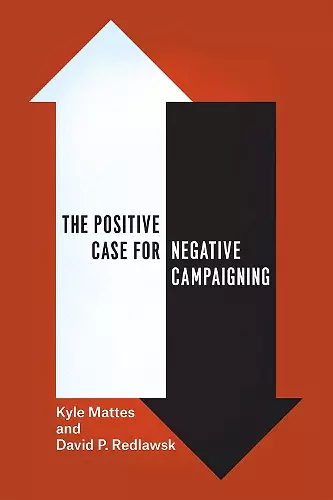The Positive Case for Negative Campaigning
David P Redlawsk author Kyle Mattes author
Format:Paperback
Publisher:The University of Chicago Press
Published:10th Feb '15
Currently unavailable, and unfortunately no date known when it will be back

Turn on the television or sign in to social media during election season and chances are you'll see plenty of negative campaigning. For decades, conventional wisdom has held that Americans hate negativity in political advertising, and some have even argued that its pervasiveness in recent seasons has helped to drive down voter turnout. Arguing against this commonly held view, Kyle Mattes and David P. Redlawsk show not only that some negativity is accepted by voters as part of the political process, but that negative advertising is necessary to convey valuable information that would not otherwise be revealed. The most comprehensive treatment of negative campaigning to date, The Positive Case for Negative Campaigning uses models, surveys, and experiments to show that much of the seeming dislike of negative campaigning can be explained by the way survey questions have been worded. By failing to distinguish between baseless and credible attacks, surveys fail to capture differences in voters' receptivity. Voters' responses, the authors argue, vary greatly and can be better explained by the content and believability of the ads than by whether the ads are negative. Mattes and Red-lawsk go on to establish how voters make use of negative information and why it is necessary. Many voters are politically naive and unlikely to make inferences about candidates' positions or traits, so the ability of candidates to go on the attack and focus explicitly on information that would not otherwise be available is crucial to voter education.
"As America continues to polarize, the frequency of attacks in campaigns will only increase. Despite evidence showing that negativity has many payoffs, there is still substantial doubt about such claims. This book enters that breach with a timely array of data and theory that should find many interested readers." (John G. Geer, Vanderbilt University)"
ISBN: 9780226202167
Dimensions: 23mm x 15mm x 2mm
Weight: 397g
256 pages